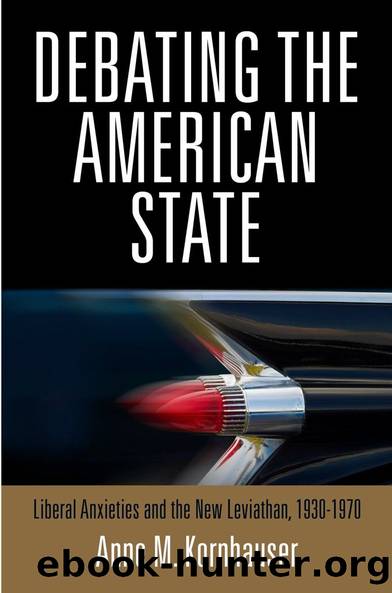Debating the American State: Liberal Anxieties and the New Leviathan, 1930-1970 by Anne M. Kornhauser

Author:Anne M. Kornhauser [Kornhauser, Anne M.]
Language: eng
Format: epub
ISBN: 9780812246872
Amazon: 081224687X
Publisher: University of Pennsylvania Press
Published: 2015-02-04T00:00:00+00:00
Legacies
Despite many opportunities, how to determine when democracy and justice were fundamentally under threat and who gets to make that determination were never fully worked out in the 1940s, either by academics or by government officials. Under the rule of law ideal some restraint, even in emergencies, was called for. But how much and under what circumstances? The German émigrés offered some intriguing answers, but they never fully resolved these tensions. During the Cold War justifications for rule by fiat reappeared to rationalize a full-blown national security state in the name of preserving democracy from the totalitarian threat.168 Yet to the extent that Cold War ideologists applied rationales similar to those who had mobilized the concept of constitutional dictatorship, it was a misapplication. Democratic institutions still existed in the United States, making the circumstances far less extraordinary than those of a former totalitarian dictatorship under military occupation.
Carl Friedrich, often depicted as a quintessential Cold War theorist, fell prey to the sort of thinking that posited a permanent state of emergency before managing to temper his anxieties about the threats of the newest totalitarian menace. In a widely read political science textbook published in 1950, Friedrich wrote, “Antidemocratic forces, whether Communist or Fascist, have created in the past and continue to create a state of universal emergency throughout the world community by their appeal to force.” In response, the policy of coercive containment must be applied in order to “re-establish constitutionalism.” Yet Friedrich continued to believe that although one could establish the conditions for democracy from the outside, one could not democratize another society by force. “It was the contention of the writer,” he noted, ruefully recalling his writings on World War II, “that it would have been wiser to restrict military government objectives to the establishment of government according to law in the conquered territories.”169
Two commitments allowed Friedrich to maintain distance from the Cold warriors. The first was his loyalty to constitutional democracy in deed and not just in name. More important was his conception of constitutional democracy as not simply a concatenation of formal apparatuses but also “a great moral and existential phenomenon,” as the political theorist George Kateb describes this view.170 Friedrich called this normative dimension of constitutional democracy “a constitutional morality, the notion that a constitution must look after the welfare of the people who live under it. It was this norm—and only this norm—that could legitimate the imposition of a constitutional order via extraconstitutional means. For this norm to function properly, moreover, required a robust notion of democracy that depended upon “an alert people . . . a real constituent power.”171 How these would come about, Friedrich could not say. But Rawls would try to tackle this very problem.
While most liberal thinkers did not pay much attention to the importance of marrying the rule of law to democratic participation in the 1950s, some pushed to use law to rein in the administrative state—a state that turned increasingly to repressive police action in its anticommunist crusade. In
Download
This site does not store any files on its server. We only index and link to content provided by other sites. Please contact the content providers to delete copyright contents if any and email us, we'll remove relevant links or contents immediately.
| Elections & Political Process | Ideologies & Doctrines |
| International & World Politics | Political Science |
| Public Affairs & Policy | Specific Topics |
| United States |
The Secret History by Donna Tartt(19053)
The Social Justice Warrior Handbook by Lisa De Pasquale(12187)
Thirteen Reasons Why by Jay Asher(8893)
This Is How You Lose Her by Junot Diaz(6877)
Weapons of Math Destruction by Cathy O'Neil(6265)
Zero to One by Peter Thiel(5786)
Beartown by Fredrik Backman(5737)
The Myth of the Strong Leader by Archie Brown(5500)
The Fire Next Time by James Baldwin(5431)
How Democracies Die by Steven Levitsky & Daniel Ziblatt(5215)
Promise Me, Dad by Joe Biden(5141)
Stone's Rules by Roger Stone(5081)
A Higher Loyalty: Truth, Lies, and Leadership by James Comey(4954)
100 Deadly Skills by Clint Emerson(4921)
Rise and Kill First by Ronen Bergman(4779)
Secrecy World by Jake Bernstein(4741)
The David Icke Guide to the Global Conspiracy (and how to end it) by David Icke(4709)
The Farm by Tom Rob Smith(4502)
The Doomsday Machine by Daniel Ellsberg(4484)
